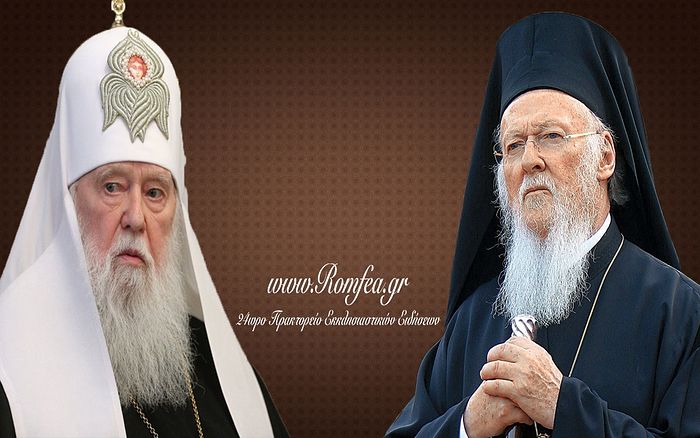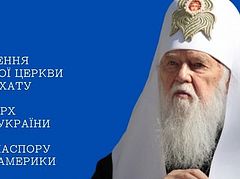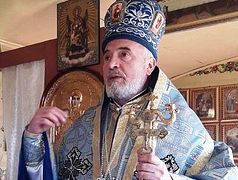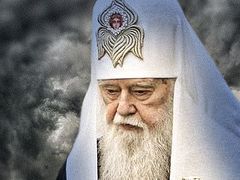Kiev, June 22, 2020
Despite numerous appeals beginning from the time of Ukrainian independence in 1991, Patriarch Bartholomew of Constantinople took more than 25 years to finally grant a tomos of autocephaly to the Orthodox in Ukraine. Though many wonder why he finally decided to grant it, the timing is tied to the Russian Orthodox Church’s non-participation in the Council of Crete in 2016, says Philaret Denisenko, the head of the schismatic “Kiev Patriarchate.”
Moreover, the tomos was granted to a minority jurisdiction and is and will remain unrecognized by the majority of the Local Churches, Philaret said in a recent interview.
In the spring and summer of 2016, several Local Churches began to pull out of the Council of Crete held in June that year. After the Bulgarian, Antiochian and Georgian Churches announced that they would not attend, and the Patriarchate of Constantinople rejected Moscow’s suggestion to hold an emergency session to address the concerns of these Local Churches, then the Moscow Patriarchate also decided not to participate.
However, as Pat. Bartholomew has told Metropolitan Hilarion of Volokolamsk, the head of the Russian Synodal Department for External Church Relations, he blames the Russian Church for the non-participation of the other Churches as well.
In an interview with ZIK on Saturday, Philaret, the ideological leader of the Ukrainian schismatic movement, stressed that he had been seeking autocephaly for 20 years.
“First from Moscow—Moscow did not respond,” he said. “Then we turned to the Ecumenical Patriarch, because the Kiev Metropolia was once part of the Patriarchate of Constantinople. We were striving for this for a long time, from the very beginning of Ukrainian independence. But the Ecumenical Patriarch set various conditions for us—first let the president appeal, then the Verkhovna Rada, then unite first. And everything was delayed.”
Recall that while Denisenko here speaks of the Kiev Metropolia once being a part of Constantinople, the granting of the tomos in early 2019 was justified by the novel historical theory that Kiev in fact always belonged to Constantinople.
The decision to grant a tomos of autocephaly finally came decades later, and many do not understand why, Philaret noted.
“To take revenge on Moscow,” he continued. “For what? For not going to the Pan-Orthodox Council held on Crete in 2016. So: You didn’t come to the council, and we will give the Ukrainian Church autocephaly,” Philaret explained.
And Philaret is not alone in this view. In an interview in December 2018, Metropolitan Kallistos (Ware), himself a retired hierarch of the Patriarchate of Constantinople, suggested that Pat. Bartholomew’s OCU project was tied to his disappointment over Crete.
Pat. Bartholomew himself explicitly rejected Patriarch John X of Antioch’s call for a pan-Orthodox council on the matter of Ukrainian autocephaly because four Churches had not attended the Crete Council.
And debating whether to recognize the OCU at a session of the Holy Synod of the Church of Greece last fall, Metropolitan Chrysostomos of Dodoni “pointed out that any problem could have been raised and solved at the Holy and Great Council of Crete (2016) if the Moscow Patriarchate had not refused, with various excuses, to attend, thereby sabotaging unanimity and unity, and even compelling other Churches. This is because Russia always has aspirations of being ‘Third Rome.’”
Met. Chrysostomos also argued that the Greek Church must stand with Constantinople because of their common Greek blood.
However, the majority of the Local Churches will not recognize Ukrainian autocephaly because they do not and do not want to recognize that the Patriarchate of Constantinople leads all the other Churches, Philaret also said in the interview.
Besides Constantinople, the primates of the Alexandrian and Greek Churches have also recognized the Ukrainian schismatics, though their decisions were not backed by a vote of their respective Holy Synods.
According to the tomos granted to the schismatic “Orthodox Church of Ukraine,” it must resolve all serious issues by appealing to Constantinople, and this is “to show that the Patriarch of Constantinople is not the first among equals, but that that he has a power that the others do not have.”
The Local Churches believe that all patriarchs are equal, Philaret stressed. “No primate has more power, but the Patriarch of Constantinople wants to have power.”
Turning again to the Crete Council, he noted that it established that only the Patriarch of Constantinople has the right to summon and preside over pan-Orthodox councils. “But if we take history, we will see that councils were called not only by the Patriarchs of Constantinople, and headed not only by the Patriarchs of Constantinople. But here the ruling of the pan-Orthodox council states that only the Patriarch of Constantinople has this power. But the other Orthodox Churches do not want to recognize it,” he explained.
To recognize the OCU’s tomos means to recognize what is written there, and the Local Churches do not want to do this, Philaret emphasized. Though officially granting autocephaly to the OCU, the tomos in fact retains Constantinople’s authority over the OCU in key areas, and also states that Constantinople is the head of all the Churches.
And while Epiphany Dumenko, the head of the OCU, is certain the other Local Churches will eventually recognize the OCU, Philaret is certain they will not, because “no one recognizes the authority of the Patriarchate of Constantinople over themselves.”
Philaret, together with his “Kiev Patriarchate,” was initially a zealous participant in the OCU project, and even embarked on a celebratory tour with then-President Poroshenko after the tomos was granted on January 6, 2019. However, as he realized he would not have the power he desired and that the OCU was less free than he desired, Philaret backed away from the newly-formed OCU, eventually departing altogether to relaunch his “Kiev Patriarchate.”
This process seems to have amended Philaret’s views about Constantinople’s historical prerogatives and rights. In May 2018, before the tomos was granted, he voiced a rather different view: “It does not matter to us if the other local Churches accept this tomos. The most important thing is to have a decision by the Ecumenical Patriarch, because it will be legitimate in every respect even if no one else supports it.”
Recall that while the schismatic OCU is officially considered autocephaly by Constantinople, it in fact enjoys less freedom and independence than the canonical Ukrainian Orthodox Church under His Beatitude Metropolitan Onuphry of Kiev and All Ukraine, which is universally recognized as an autonomous body within the Russian Orthodox Church.




